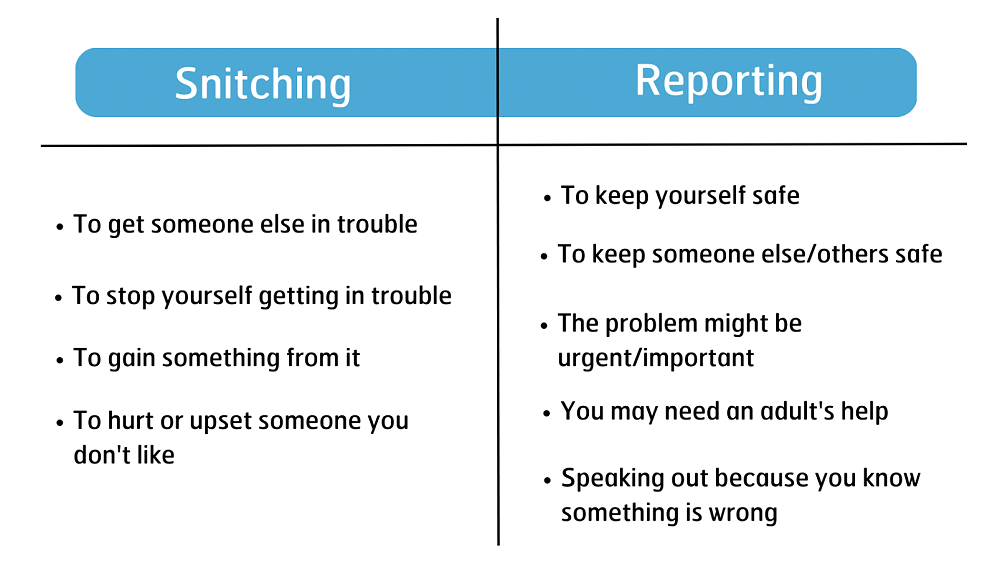
Snitching vs. Reporting
“I can’t say anything otherwise I will be called a snitch.” This kind of comment is not uncommon which is why it is so important to help students see the difference between snitching and reporting something that is wrong. It is vital that young people feel empowered to speak up and do the right thing.
“Young people would rather get into trouble themselves than be seen as a snitch” (Allnock & Atkinson, 2019). Whilst this may sound alarming to us as adults, when we consider factors such as peer pressure, wanting to fit in, and seeking approval from peers, we can understand how hard it can be for young people to do the right thing and to be an upstander. Therefore it is vital that we act as role models, address this issue, and talk about this topic whenever we have the opportunity to do so. This newsletter contains an explanation of the differences between snitching and reporting and some ways you can talk about this at home.
You are reporting something that is wrong if:
You are doing so to keep yourself safe
You are doing so to keep others safe
You need an adult’s help
The situation is urgent, harmful or dangerous
The situation is stopping you from learning
You know the situation is not okay and you need to speak up/be an upstander
You are snitching if:
You are telling on someone only to get them into trouble
You are telling on someone to avoid getting into trouble yourself
The situation is accidental and not causing significant harm
The situation is something that you can resolve yourself
The situation is something that can be ignored
Obviously each situation is different, which is why it is important to talk things through and look at the difference between reporting and snitching. If your child raises this topic with you, I would encourage you to look at the situation in relation to both of the lists above. If something needs to be reported, decide on a plan of action to do this. For example, identifying a trusted adult to talk to or thinking about the school processes that can be accessed, such as the KiVa system. If the situation does not need to be reported, problem-solve and talk with your child about how they can cope with the behaviours, and empathise with how they may be feeling.
Sometimes the accusation of being a snitch is made by others so that they can avoid getting into trouble. This may be because they are feeling uncomfortable about what they have done. I have therefore developed an additional list for discussion:
You may be unfairly accusing someone of being a snitch if you:
Are doing so in the hope that they will not report your behaviour
Know that you have done something that is not okay and feel that this is the best way to avoid a consequence
Know that you have done something that is not okay and are feeling frustrated and have reacted in the heat of the moment.
The above list of reactions is completely understandable for students, especially if they are feeling embarrassed or regretful about something that they have done. It is vital to empathise with the young person involved and let them know you are here to support them. Talk things through with your child so that they can own their behaviour, make things better and learn from this experience by making a plan for how to make better choices in the future.
I hope that this provides a helpful guide for discussion around this topic. Please do not hesitate to make contact if you would like to discuss this topic further.
Image sourced from: https://crimestoppers-uk.org/fearless/parents-guardians
Jenelle Hooson
Jenelle is a Registered Provisional Member with NZAC (New Zealand Association of Counsellors).
If you wish to discuss the services the School Counsellor can provide, please see your son’s homeroom teacher or Scott Johnson: scott.johnson@medbury.school.nz.
